
Back Richard Buckminster Fuller ALS ريتشارد بوكمينستر فولر Arabic ريتشارد بوكمينستر فولر ARZ Richard Buckminster Fuller AST باکمینستر فولر AZB Рычард Бакмінстэр Фулер Byelorussian Рычард Бакмінстэр Фулер BE-X-OLD Бъкминстър Фулър Bulgarian বাকমিন্স্টার ফুলার Bengali/Bangla Buckminster Fuller BS
Buckminster Fuller | |
|---|---|
 Fuller in 1972 | |
| Born | Richard Buckminster Fuller July 12, 1895 Milton, Massachusetts, U.S. |
| Died | July 1, 1983 (aged 87) Los Angeles, California, U.S. |
| Occupations |
|
| Spouse |
Anne Hewlett (m. 1917) |
| Children | 2, including Allegra Fuller Snyder |
| Awards | Presidential Medal of Freedom (1983) |
| Buildings | Geodesic dome (1940s) |
| Projects | Dymaxion house (1928) |
Philosophy career | |
| Education | Harvard University (expelled) |
| Notable work |
|
| Family |
|
| Era | 20th-century philosophy |
| Region | |
Main interests | |
Notable ideas | |
|
Preview warning: Page using Template:Infobox philosopher with unknown parameter "influences" Preview warning: Page using Template:Infobox philosopher with unknown parameter "influenced" | |
Richard Buckminster Fuller (/ˈfʊlər/; July 12, 1895 – July 1, 1983)[1] was an American architect, systems theorist, writer, designer, inventor, philosopher, and futurist. He styled his name as R. Buckminster Fuller in his writings, publishing more than 30 books and coining or popularizing such terms as "Spaceship Earth", "Dymaxion" (e.g., Dymaxion house, Dymaxion car, Dymaxion map), "ephemeralization", "synergetics", and "tensegrity".
Fuller developed numerous inventions, mainly architectural designs, and popularized the widely known geodesic dome; carbon molecules known as fullerenes were later named by scientists for their structural and mathematical resemblance to geodesic spheres. He also served as the second World President of Mensa International from 1974 to 1983.[2][3]
Fuller was awarded 28 United States patents[4] and many honorary doctorates. In 1960, he was awarded the Frank P. Brown Medal from The Franklin Institute. He was elected an honorary member of Phi Beta Kappa in 1967, on the occasion of the 50-year reunion of his Harvard class of 1917 (from which he was expelled in his first year).[5][6] He was elected a Fellow of the American Academy of Arts and Sciences in 1968.[7] The same year, he was elected into the National Academy of Design as an Associate member. He became a full Academician in 1970, and he received the Gold Medal award from the American Institute of Architects the same year. Also in 1970, Fuller received the title of Master Architect from Alpha Rho Chi (APX), the national fraternity for architecture and the allied arts.[8] In 1976, he received the St. Louis Literary Award from the Saint Louis University Library Associates.[9][10] In 1977, he received the Golden Plate Award of the American Academy of Achievement.[11] He also received numerous other awards, including the Presidential Medal of Freedom, presented to him on February 23, 1983, by President Ronald Reagan.[12]
- ^ Encyclopædia Britannica. (2007). "Fuller, R. Buckminster". Encyclopædia Britannica Online. Archived from the original on October 21, 2007. Retrieved April 20, 2007.
- ^ Serebriakoff, Victor (1986). Mensa: The Society for the Highly Intelligent. Stein and Day. pp. 299, 304. ISBN 978-0-8128-3091-0.
- ^ Staff (2010). "The History of Mensa: Chapter 1: The Early Years (1945-1953)". Mensa Switzerland. Archived from the original on March 8, 2019. Retrieved March 8, 2019.
- ^ "Partial list of Fuller U.S. patents". Retrieved April 18, 2014.
- ^ "Catalogue of Members: Harvard members elected from 1966-1981" (PDF). Harvard College Phi Beta Kappa. Archived (PDF) from the original on October 9, 2022. Retrieved January 31, 2015.
- ^ Sieden, L. Steven (2011). "Biography of R. Buckminster Fuller - Section 4: 1947–1976". BuckyFullerNow.com. Archived from the original on February 26, 2015. Retrieved January 31, 2015.
- ^ "Book of Members, 1780–2010: Chapter F" (PDF). American Academy of Arts and Sciences. Archived (PDF) from the original on October 9, 2022. Retrieved April 7, 2011.
- ^ ""Website of Alpha Rho Chi"". Retrieved October 16, 2023.
- ^ "Website of St. Louis Literary Award". Archived from the original on April 27, 2019. Retrieved July 25, 2016.
- ^ Saint Louis University Library Associates. "Recipients of the Saint Louis Literary Award". Archived from the original on July 31, 2016. Retrieved July 25, 2016.
- ^ "Golden Plate Awardees of the American Academy of Achievement". www.achievement.org. American Academy of Achievement.
- ^ Remarks at the Presentation Ceremony for the Presidential Medal of Freedom Reagan Library. February 23, 1983. Retrieved May 8, 2024
© MMXXIII Rich X Search. We shall prevail. All rights reserved. Rich X Search